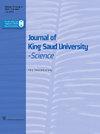Tangeretin alleviates malathion-instigated testicular toxicity via ameliorating biochemical, apoptotic, hormonal & steroidogenic markers
IF 3.7
3区 综合性期刊
Q1 MULTIDISCIPLINARY SCIENCES
引用次数: 0
Abstract
Malathion (MLT) is an organophosphate pesticide that instigates severe injuries in the testicular tissues. Tangeretin (TGN) is an important naturally present flavone that shows potential antioxidant and anti-apoptotic activities. This research was planned to ascertain the palliative role of TGN against MLT-instigated testicular toxicity in male Sprague-Dawley (SD) rats. 48 rats were distributed into 4 groups: control, MLT (100 mgkg−1), MLT+TGN (100 + 50 mgkg−1 respectively), and TGN (50 mgkg−1). The results showed that MLT exposure reduced the activities of catalase (CAT), glutathione reductase (GSR), superoxide dismutase (SOD), glutathione peroxidase (GPx), and glutathione (GSH), whereas escalated the levels of reactive oxygen species (ROS) and malondialdehyde (MDA). Moreover, it decreased the levels of luteinizing hormone (LH), plasma testosterone, and follicle-stimulating hormone (FSH). MLT also reduced the expressions of steroidogenic enzymes, including StAR, 3β-HSD, and 17β-HSD. Additionally, MLT exposure increased the expressions of Bax and Caspase-3, while reducing the Bcl-2 expressions. MLT administration also increased the levels of inflammatory markers such as nuclear factor kappa B (NF-κB), tumor necrosis factor alpha (TNF-α), interleukin-6 (IL-6), interleukin-1 beta (1L-1β) as well as cyclooxygenase-2 (COX-2) activity in testes. Nonetheless, TGN recovered all the MLT induced damages in testes. In conclusion, TGN could ameliorate MLT instigated testicular impairment because of its anti-apoptotic, androgenic and anti-oxidant properties.
橘皮素通过改善生化、细胞凋亡、激素和类固醇生成标记物,减轻马拉硫磷诱发的睾丸毒性
马拉硫磷(MLT)是一种有机磷农药,会对睾丸组织造成严重伤害。橘皮素(TGN)是一种重要的天然黄酮,具有潜在的抗氧化和抗凋亡活性。本研究旨在确定橘皮素对雄性斯普拉格-道利(SD)大鼠睾丸毒性的缓解作用。48 只大鼠被分为 4 组:对照组、MLT 组(100 毫克/公斤-1)、MLT+TGN 组(分别为 100 + 50 毫克/公斤-1)和 TGN 组(50 毫克/公斤-1)。结果表明,暴露于 MLT 会降低过氧化氢酶(CAT)、谷胱甘肽还原酶(GSR)、超氧化物歧化酶(SOD)、谷胱甘肽过氧化物酶(GPx)和谷胱甘肽(GSH)的活性,同时提高活性氧(ROS)和丙二醛(MDA)的水平。此外,它还降低了黄体生成素(LH)、血浆睾酮和促卵泡激素(FSH)的水平。MLT 还降低了类固醇生成酶的表达,包括 StAR、3β-HSD 和 17β-HSD。此外,暴露于 MLT 会增加 Bax 和 Caspase-3 的表达,同时降低 Bcl-2 的表达。服用 MLT 还增加了睾丸中的炎症标志物水平,如核因子卡巴 B(NF-κB)、肿瘤坏死因子α(TNF-α)、白细胞介素-6(IL-6)、白细胞介素-1β(1L-1β)以及环氧化酶-2(COX-2)活性。然而,TGN 可以恢复 MLT 对睾丸造成的所有损伤。总之,TGN 具有抗凋亡、雄激素和抗氧化的特性,因此可以改善 MLT 引起的睾丸损伤。
本文章由计算机程序翻译,如有差异,请以英文原文为准。
求助全文
约1分钟内获得全文
求助全文
来源期刊

Journal of King Saud University - Science
Multidisciplinary-Multidisciplinary
CiteScore
7.20
自引率
2.60%
发文量
642
审稿时长
49 days
期刊介绍:
Journal of King Saud University – Science is an official refereed publication of King Saud University and the publishing services is provided by Elsevier. It publishes peer-reviewed research articles in the fields of physics, astronomy, mathematics, statistics, chemistry, biochemistry, earth sciences, life and environmental sciences on the basis of scientific originality and interdisciplinary interest. It is devoted primarily to research papers but short communications, reviews and book reviews are also included. The editorial board and associated editors, composed of prominent scientists from around the world, are representative of the disciplines covered by the journal.
 求助内容:
求助内容: 应助结果提醒方式:
应助结果提醒方式:


